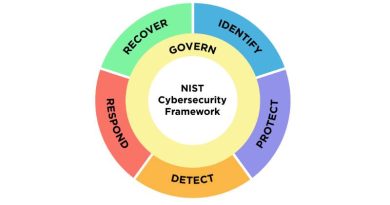All The US Midterm-Related Lies To Expect When You’re Electing
Misinformation related to tomorrow’s US midterm elections hasn’t slowed, according to security researchers.
This includes more misleading election ads on Google, as well “alternate facts” about voting systems manufacturers, all of which aims to cast doubt on election results, according to two reports published today.
Lies about voting machines developed by the big three in the field — Dominion Voting Systems, Election Systems & Software, and Smartmatic — include the idea that these three manufacturers’ machines will be used to falsify the 2022 midterm election results are already circulating, according to the report from security intelligence firm, Recorded Future.
“Misinformation and disinformation targeting these companies will almost certainly continue to be generated from existing election denialist cohorts on the political right,” according to a report [PDF]. States seeing the most voting machine disinformation will likely be Georgia, Wisconsin, Arizona, Pennsylvania, Nevada, and Florida.
Additionally, the “vast majority” of lies about voting machines come from within the US, rather than from foreign sources, according to the report, echoing an earlier dossier about so-called “pink-slime newsrooms” spending millions of dollars on social media in the lead up to the 2022 midterms. These are hyper-partisan publications dressed up as independent regional media that push netizens to obviously biased articles.
Recorded Future’s researchers do, however, expect “a decrease in the intensity of such efforts” compared to 2020 “due to the absence of former president Donald Trump from the ballot,” and the fact that midterms don’t usually get as much attention — and thus as many fake-news stories — as presidential elections.
The big three voting machines
Dominion, which supplies voting technology for more than 1,200 jurisdictions across the US for tomorrow’s midterms, has sued Fox News, Newsmax Media, One America News, Mike Lindell, Sidney Powell, Patrick Byrne and Rudy Giuliani to stop the spread of disinformation that the manufacturer says has “severely damaged our company and diminished the credibility of US elections.”
Despite the company’s legal efforts as well as validation from CISA, the FBI and the US Director of National Intelligence, the report cited false claims about rigged 2022 elections across Facebook, Instagram, Telegram, Gab, Patriots.win and, of course, 4chan.
Some of this disinformation comes from Russian propaganda outlets including Red Spring Information Agency and the Centre for Research on Globalization, according to Recorded Future’s findings.
Election Systems & Software (ES&S), meanwhile, will provide machines for “thousands” of jurisdictions tomorrow, “including a substantial number in historical swing states and current hotbeds of election disinformation Arizona, Pennsylvania and Florida,” the report adds.
While ES&S is not as popular a target as Dominion or Smartmatic, the report authors noted Big-Lie related misinformation about the manufacturer carrying over into tomorrow’s midterms. This includes a partisan Gateway Pundit article claiming that ES&S machines in Alabama accepted “xeroxed” copies of official ballots.
And although California’s Los Angeles County will be the only US jurisdiction to use Smartmatric voting technology in the November midterms, LA’s size and prominence, coupled with gerrymandering allegations, have already contributed to fake news stories claiming the manufacturers machines will be used to falsify election results across Patriots.win, Gab, 4chan, Trump’s Truth Social, and Telegram, according to the report.
“Most of these claims are made under the false assumption that Smartmatic is a subsidiary or contractor of Dominion Voting Systems, which administers elections across many more jurisdictions than Smartmatic,” it said.
Recorded Future also cited a September 25 article by a new media outlet called Semafor alleging that Smartmatic is currently the subject of a US Department of Justice investigation focused on potentially corrupt business practices in the Philippines in 2016. The security shop said it has not been able to find any reliable sources to confirm any such DOJ investigation.
“As in 2020, it is also likely that conspiracy theorists will insist that Smartmatic technology was used in other jurisdictions where favored candidates lose, such as those jurisdictions that use Dominion hardware,” according to the report.
Hey, Google, why the misleading ads?
As if this isn’t enough, another investigation, this one by the non-profit Tech Transparency Project (TTP), claims Google is still serving up misleading ads in English and Spanish despite its earlier pledges to provide accurate information about voting.
TTP searched Google for voting- and election-related terms, using a clean, logged out version of the Google Chrome browser to avoid biasing results, and queried each term in English and Spanish on three different virtual private networks to make it appear that the searches originated in Florida, Texas, and Arizona.
The watchdog organization then recorded every ad on the first 10 pages of search results for a total of 291 ads. Of the 291 ads, 27 directed users to so-called search arbitrage sites with low-quality search results that advertise on Google to generate clicks.
“For example, when a user searched for ‘Register to vote in Arizona,’ Google served an ad that read, ‘How Do I Register To Vote In AZ – Find Results Now.’ But the ad took the user to an ad-filled search page on gopher.com, not a voter registration site,” the report noted.
TTP also found Google queries directing voters to sites that charge users to check their registration status, which is free service on several state and non-profit websites. This included the Florida-based “user’s” search for “Registro de votantes” (“Register to vote”), which pulled up an ad that said “Registros De Votantes – Solo Ingresa El Nombre” (“Register to Vote – Just Enter the Name”).
This ad directed the user to a website called PublicRecordsReviews that requested a name, which then redirected to another site called TruthFinder that required the user to enter more information. And “only at the very end of the process did the site inform the user they have to pay $23 to $28 to check if they’re registered to vote,” TTP wrote.
Incidentally, it turns out TruthFinder is the subject of hundreds of complaints lodged with the Better Business Bureau, including more than 300 complaints in the last three years.
Today’s report follows a 2020 investigation by TTP that found Google was selling ads to similarly scammy advertisers in search results for terms like “register to vote” and “vote by mail.”
“Google still hasn’t dedicated the necessary resources to responsibly approve ads for even the most basic searches about voting,” Campaign for Accountability Executive Director Michelle Kuppersmith said in a statement. Campaign for Accountability runs TTP.
“If Google can’t profit from searches for election information responsibly,” Kuppersmith continued, “it shouldn’t be profiting at all.” ®
READ MORE HERE



